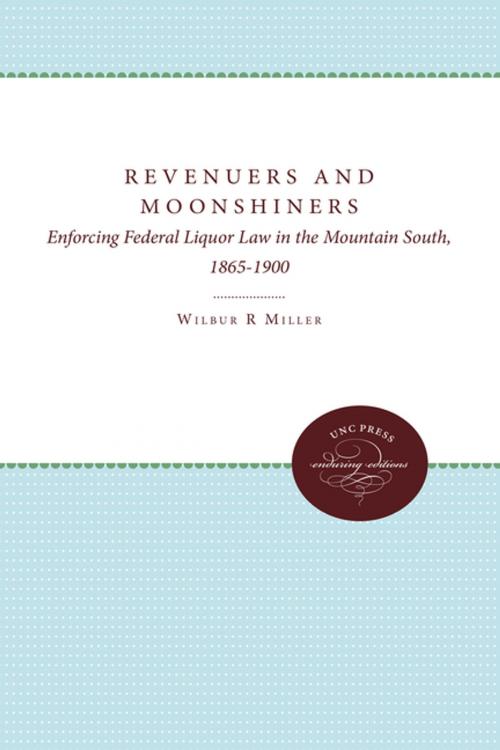Revenuers and Moonshiners
Enforcing Federal Liquor Law in the Mountain South, 1865-1900
Nonfiction, History, Americas, United States| Author: | Wilbur R. Miller | ISBN: | 9781469639710 |
| Publisher: | The University of North Carolina Press | Publication: | November 1, 2017 |
| Imprint: | The University of North Carolina Press | Language: | English |
| Author: | Wilbur R. Miller |
| ISBN: | 9781469639710 |
| Publisher: | The University of North Carolina Press |
| Publication: | November 1, 2017 |
| Imprint: | The University of North Carolina Press |
| Language: | English |
The federal government's attempt to enforce civil rights measures during Reconstruction is usually regarded as a failure. Far more successful, however, was the collection of federal excise taxes on liquor during the same period -- an effort that secured for the government its single most important source of internal revenue. In Revenuers and Moonshiners Wilbur Miller explores the development and professionalization of the federal bureaucracy by examining federal liquor law enforcement in the mountain South after the Civil War. He addresses the central questions of the conditions under which unpopular federal laws could be enforced and the ways in which enforcement remained limited.
The extension of federal taxing power to cover homemade whiskey was fiercely resisted by mountain people, who had long relied on distilling to produce an easily transported and readily salable product made from their corn. As a result, the collection of the tax required the creation of the most extensive civilian law enforcement agency in the nation's history, the Bureau of Internal Revenue. The bureau both regulated taxpaying distilleries and combated illicit production. This battle against moonshiners, Miller argues, implemented by the Republican party's vision of a federal authority capable of reaching into the most remote parts of the nation.
Miller concentrates his analysis on the revenuers, but he nevertheless draws a clear picture of the mountain people who resisted them. He dispels traditional views of moonshiners as folk heroes imbued with a stubborn individualism or simple country folk victimized by outside forces beyond their control or understanding. Rather, Miller shows that the men (and sometimes women) who made moonshine were members of a complex and changing society that was a product of both traditional aspects of mountain culture and the forces of industrialization that were reshaping their society after the Civil War.
Originally published in 1991.
A UNC Press Enduring Edition -- UNC Press Enduring Editions use the latest in digital technology to make available again books from our distinguished backlist that were previously out of print. These editions are published unaltered from the original, and are presented in affordable paperback formats, bringing readers both historical and cultural value.
The federal government's attempt to enforce civil rights measures during Reconstruction is usually regarded as a failure. Far more successful, however, was the collection of federal excise taxes on liquor during the same period -- an effort that secured for the government its single most important source of internal revenue. In Revenuers and Moonshiners Wilbur Miller explores the development and professionalization of the federal bureaucracy by examining federal liquor law enforcement in the mountain South after the Civil War. He addresses the central questions of the conditions under which unpopular federal laws could be enforced and the ways in which enforcement remained limited.
The extension of federal taxing power to cover homemade whiskey was fiercely resisted by mountain people, who had long relied on distilling to produce an easily transported and readily salable product made from their corn. As a result, the collection of the tax required the creation of the most extensive civilian law enforcement agency in the nation's history, the Bureau of Internal Revenue. The bureau both regulated taxpaying distilleries and combated illicit production. This battle against moonshiners, Miller argues, implemented by the Republican party's vision of a federal authority capable of reaching into the most remote parts of the nation.
Miller concentrates his analysis on the revenuers, but he nevertheless draws a clear picture of the mountain people who resisted them. He dispels traditional views of moonshiners as folk heroes imbued with a stubborn individualism or simple country folk victimized by outside forces beyond their control or understanding. Rather, Miller shows that the men (and sometimes women) who made moonshine were members of a complex and changing society that was a product of both traditional aspects of mountain culture and the forces of industrialization that were reshaping their society after the Civil War.
Originally published in 1991.
A UNC Press Enduring Edition -- UNC Press Enduring Editions use the latest in digital technology to make available again books from our distinguished backlist that were previously out of print. These editions are published unaltered from the original, and are presented in affordable paperback formats, bringing readers both historical and cultural value.















